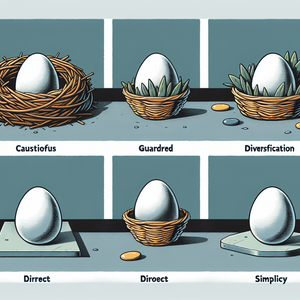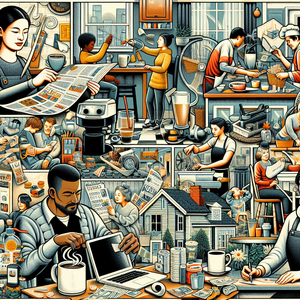The Hidden Skills for Entry-Level UX Jobs

At the heart of effective UX design is the ability to empathize with users. This skill involves understanding the needs, frustrations, and desires of the target audience, which is vital for creating designs that resonate with users. Aspiring designers should cultivate an empathetic mindset, which can be demonstrated through user research, interviews, and usability testing. Example: A recent graduate, Sarah, landed her first UX job by sharing her insights from a project where she conducted interviews with potential users. She presented data that highlighted user pain points and illustrated how her design addressed these issues.
Communication Skills
Strong communication skills are essential for articulating design ideas, collaborating with team members, and presenting concepts to stakeholders. Entry-level designers must convey their design rationale clearly and confidently, both verbally and in writing. Example: During an interview, John, an aspiring UX designer, effectively communicated his design process and decisions. He illustrated how he incorporated feedback from team members and users into his final design.
Adaptability and Willingness to Learn
The tech industry is ever-evolving, and UX design is no exception. Employers look for candidates who demonstrate adaptability and a growth mindset. Being open to feedback and willing to learn new tools or methodologies can set candidates apart from their peers. Example: Emily, a self-taught UX designer, showcased her adaptability by discussing how she independently learned a new prototyping tool to enhance her design process.
Collaboration and Teamwork
UX design is rarely a solitary endeavor; it often involves working closely with cross-functional teams, including developers, product managers, and marketers. Demonstrating strong collaboration skills and the ability to work effectively within a team is crucial for entry-level positions. Example: Mark shared his experience of working on a group project during his internship, where he collaborated with other designers and developers.
Critical Thinking and Problem-Solving
The ability to analyze problems, think critically, and devise effective solutions is a key skill in UX design. Employers value candidates who can approach challenges logically and creatively. Example: When faced with a design challenge during a project, Lisa applied critical thinking to evaluate user feedback and iteratively improve her design.
As aspiring UX designers prepare to enter the job market, it is crucial to recognize the hidden skills that can enhance their profiles. Empathy, communication, adaptability, collaboration, and critical thinking are all essential traits that can significantly impact a candidate's success.
Junior UX Researcher
Tech startups, design agencies, and large corporations with dedicated UX teams
Core Responsibilities
Conduct user interviews and usability testing to gather qualitative data.
Analyze user feedback to identify pain points and areas for improvement in designs.
Collaborate with UX designers and product teams to translate research findings into actionable insights.
Required Skills
Strong communication skills to articulate research findings and user needs.
Familiarity with research methodologies, including surveys and A/B testing.
Proficiency in tools such as UserTesting or Lookback for conducting and analyzing tests.
Entry-Level Interaction Designer
E-commerce platforms, software companies, and mobile app developers
Core Responsibilities
Design interactive elements of websites and applications, ensuring a seamless user experience.
Create wireframes, prototypes, and user flows to visualize design concepts.
Collaborate with developers to implement designs and ensure fidelity to original concepts.
Required Skills
Proficiency in design tools like Figma, Sketch, or Adobe XD.
Understanding of user-centered design principles and best practices.
Ability to think critically about user interactions and advocate for the user experience.
UX/UI Design Intern
Design studios, tech startups, and educational institutions offering design services
Core Responsibilities
Assist in the design and development of user interface elements for digital products.
Participate in brainstorming sessions and contribute to design discussions.
Conduct competitor analysis to inform design decisions and identify industry trends.
Required Skills
Basic knowledge of design software and a portfolio showcasing design projects.
Ability to accept and apply feedback from senior team members.
Eagerness to learn about UX best practices and trends in the industry.
Usability Tester
User experience consultancies, tech companies, and healthcare organizations focused on patient experience
Core Responsibilities
Conduct usability tests on websites and applications to evaluate their effectiveness and user satisfaction.
Document and analyze test results, providing actionable recommendations for improvements.
Collaborate with UX teams to refine products based on user feedback.
Required Skills
Detail-oriented with strong analytical skills to interpret data from user tests.
Experience with usability testing tools and methods, such as heuristic evaluation.
Ability to communicate findings clearly to both technical and non-technical stakeholders.
Digital Product Coordinator
Tech companies, product design firms, and marketing agencies focused on digital product development
Core Responsibilities
Support UX teams in managing project timelines, resources, and deliverables for digital products.
Assist in the preparation of presentations and documentation for stakeholders.
Coordinate user research activities and help synthesize findings into reports.
Required Skills
Strong organizational skills and attention to detail to manage multiple projects simultaneously.
Familiarity with project management tools such as Trello or Asana.
Basic understanding of UX principles and the product development lifecycle.


